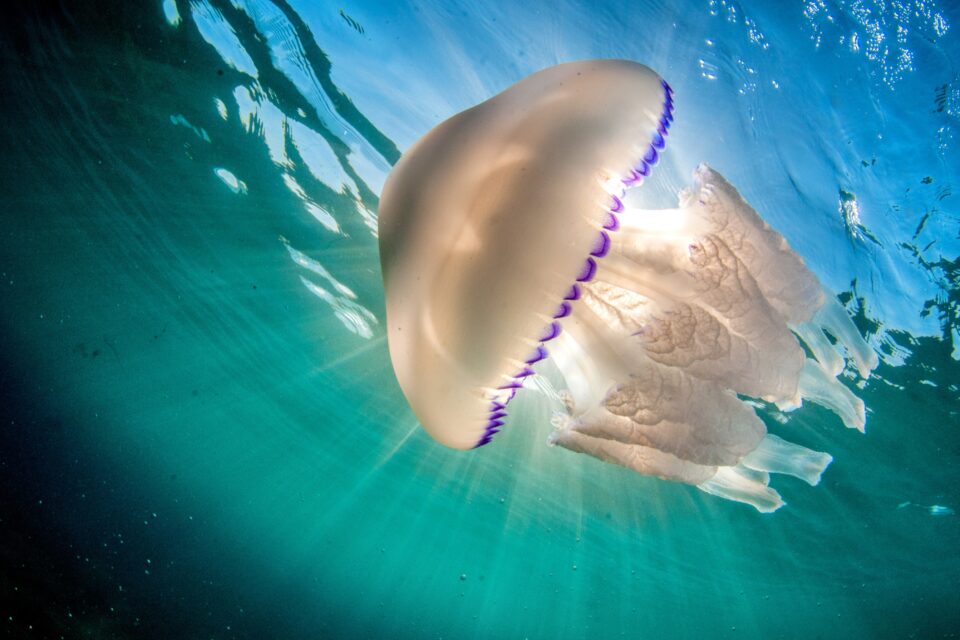Jellyfish can learn from past experiences - even without a central brain

The long-held belief that jellyfish are simple creatures with limited cognitive abilities has been dramatically overturned.
A new study from the University of Copenhagen reveals that Caribbean box jellyfish are far more advanced than previously thought, displaying complex learning abilities despite their rudimentary nervous systems.
Not so simple
While jellyfish have inhabited our planet for over 500 million years, their reputation has mostly been that of uncomplicated beings.
This notion has been largely based on their primitive nervous systems, particularly when compared to organisms with advanced centralized brains. The research, however, challenges this perspective.
“It was once presumed that jellyfish can only manage the simplest forms of learning, including habituation – i.e., the ability to get used to a certain stimulation, such as a constant sound or constant touch,” said study co-author Professor Anders Garm.
“Now, we see that jellyfish have a much more refined ability to learn, and that they can actually learn from their mistakes. And in doing so, modify their behavior.”
Focus of the study
The focus of this research was the Caribbean box jellyfish, Tripedalia cystophora. Despite having only about a thousand nerve cells, these jellyfish displayed sophisticated learning mechanisms that allowed them to adapt their behavior based on experiences. Remarkably, they achieve this advanced learning at a rate similar to that of fruit flies and mice.
The team’s experiments highlighted how these jellyfish use visual contrasts to gauge their distance from mangrove roots, enabling them to avoid potential harm.
What’s even more fascinating is their ability to adjust their behavior based on changes in contrast conditions due to various environmental factors.
Associative learning
“Our experiments show that contrast, i.e., how dark the root is in relation to the water, is used by the jellyfish to assess distances to roots, which allows them to swim away at just the right moment. Even more interesting is that the relationship between distance and contrast changes on a daily basis due to rainwater, algae and wave action,” said Professor Garm.
“We can see that as each new day of hunting begins, box jellyfish learn from the current contrasts by combining visual impressions and sensations during evasive maneuvers that fail.”
“So, despite having a mere one thousand nerve cells – our brains have roughly 100 billion – they can connect temporal convergences of various impressions and learn a connection – or what we call associative learning. And they actually learn about as quickly as advanced animals like fruit flies and mice.”
Study implications
This research is redefining our understanding of the capabilities of simple nervous systems. It presents the intriguing idea that advanced learning might have been a fundamental evolutionary advantage from the very inception of nervous systems.
“For fundamental neuroscience, this is pretty big news. It provides a new perspective on what can be done with a simple nervous system. This suggests that advanced learning may have been one of the most important evolutionary benefits of the nervous system from the very beginning,” said Garm.
Further studies are now focusing on identifying the specific nerve cells responsible for this learning in jellyfish.
This knowledge could ultimately lead to a broader understanding about memory processes across different species and might even contribute to our comprehension of complex conditions like dementia.
A supermodel system
The research team has also shown where the learning is happening in these box jellyfish. This has given them the unique opportunity to study the precise changes that occur in a nerve cell when it is involved in advanced learning.
“We hope that this can become a supermodel system for looking at cellular processes in the advanced learning of all sorts of animals,” said Professor Garm.
“We are now in the process of trying to pinpoint exactly which cells are involved in learning and memory formation. Upon doing so, we will be able to go in and look at what structural and physiological changes occur in the cells as learning takes place.”
Learning how memory works
Professor Garm said that the team will eventually look for the same mechanisms in other animals, to see if this is how memory works in general.
“Understanding something as enigmatic and immensely complex as the brain is in itself an absolutely amazing thing. But there are unimaginably many useful possibilities.”
“One major problem in the future will undoubtedly be various forms of dementia. I don’t claim that we are finding the cure for dementia, but if we can gain a better understanding of what memory is, which is a central problem in dementia, we may be able to lay a building block to better understand the disease and perhaps counteract it.”
The study is published in the journal Current Biology.









